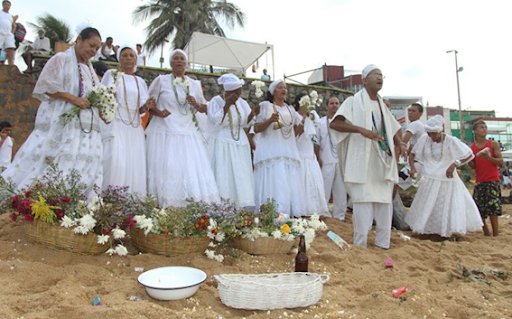New Year in Salvador, Brazil
by Sr. Sheila Campbell, MMM Ireland/ Brazil 30.12.2021
 For several years I lived in Salvador, a seaside city in the Northeast of Brazil in Bahia State. New Year was a special time for us as it was a time to mix and mingle with people of other religious traditions.
For several years I lived in Salvador, a seaside city in the Northeast of Brazil in Bahia State. New Year was a special time for us as it was a time to mix and mingle with people of other religious traditions.
New Year’s Eve begins in the usual Catholic tradition with the Vigil Mass for Mary, Mother of God. But it also celebrates the World Day of Peace so everyone comes to the church dressed in white. The liturgy is enthusiastic, often singing, dancing and waving banners promoting peace. New Year greetings are passed around among the parishioners, the final blessing given and then…..
Then a whole new celebration began!
Salvador is a city that has been marked by the African Slave trade, almost 80% of the population is Afro-Brazilian. As newly arrived slaves they were forcibly baptized as Catholics and their own religious traditions ignored and persecuted. Of course they did not disappear, but were practiced secretly under the guise of Devotion to the Saints! Thus Oxalá became Jesus Christ, Yemanjá, the orixá of the waters and oceans became Mary, Star of the Sea and so on. Only since 1970 has Candomblé (a blend of Yoruba and Bantu traditions) been allowed to be practiced openly. And New Year’s night is a night of special celebration.
After Mass, we would go down to the beach; most of our neighbors would come out of their houses too, and begin streaming in the same direction. Chatting and laughing, we would make our way, each one carrying something to eat or drink. Once on the beach there would be a quieting of the atmosphere. Those of the Candomblé faith, (also dressed in white) would hold their own ceremonies of song and dance. They would bring small offerings of flowers or candles to the sea to honor Yemanjá. We would also touch the waters and bless ourselves and for the year to come. The civil authorities would have a fireworks display in the more affluent areas, but from our poor neighborhood we could see them too, and enjoy the show!
New Year’s celebrations were a good example of inter-religious dialogue held in a harmonious and simple way. No theological discourse, no studied civility! Just passing back and forward food and drink and sharing a joyful moment of celebration.
First published by Global Sisters Report 2020
SEE ALL BLOG POSTS
